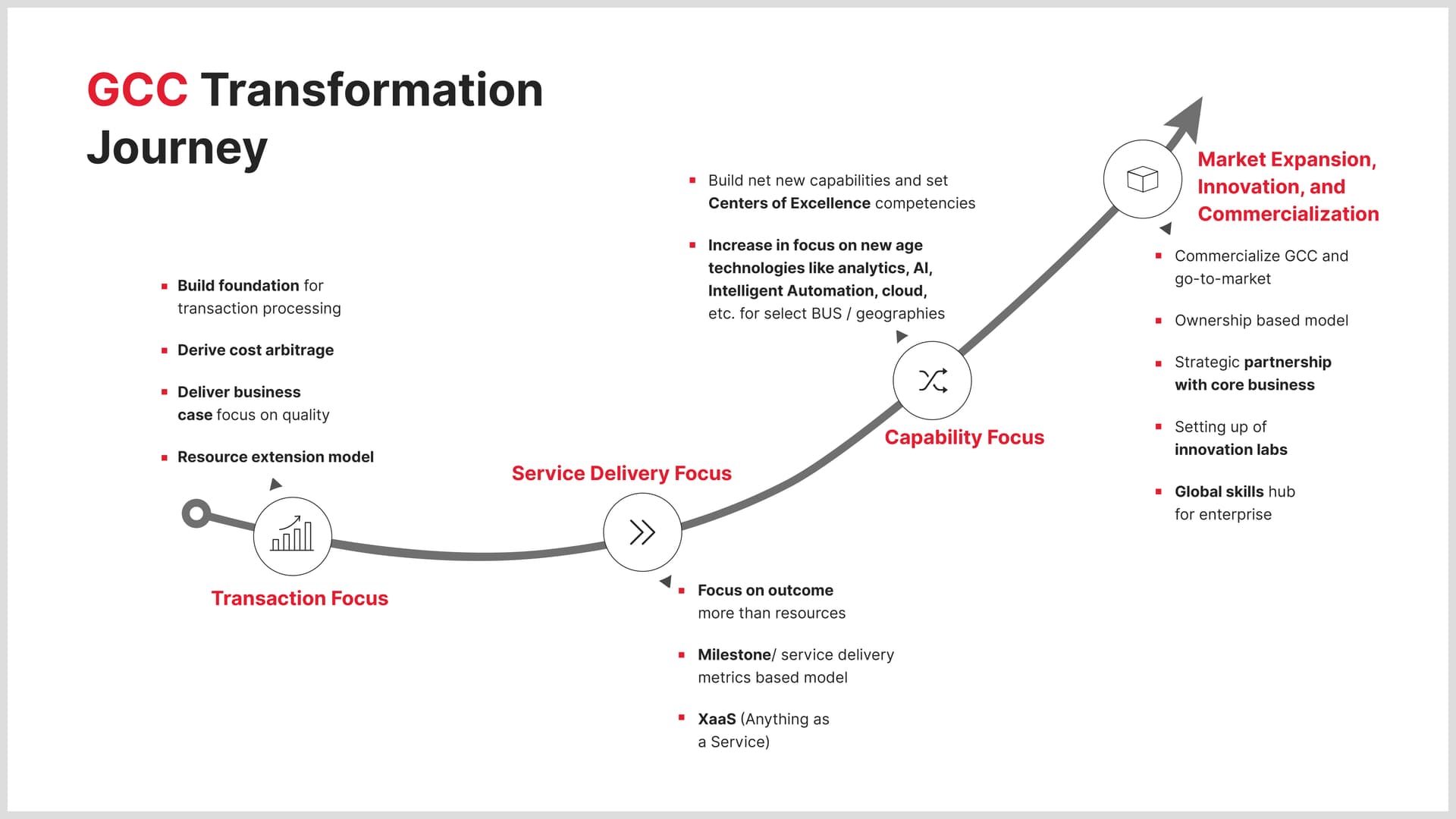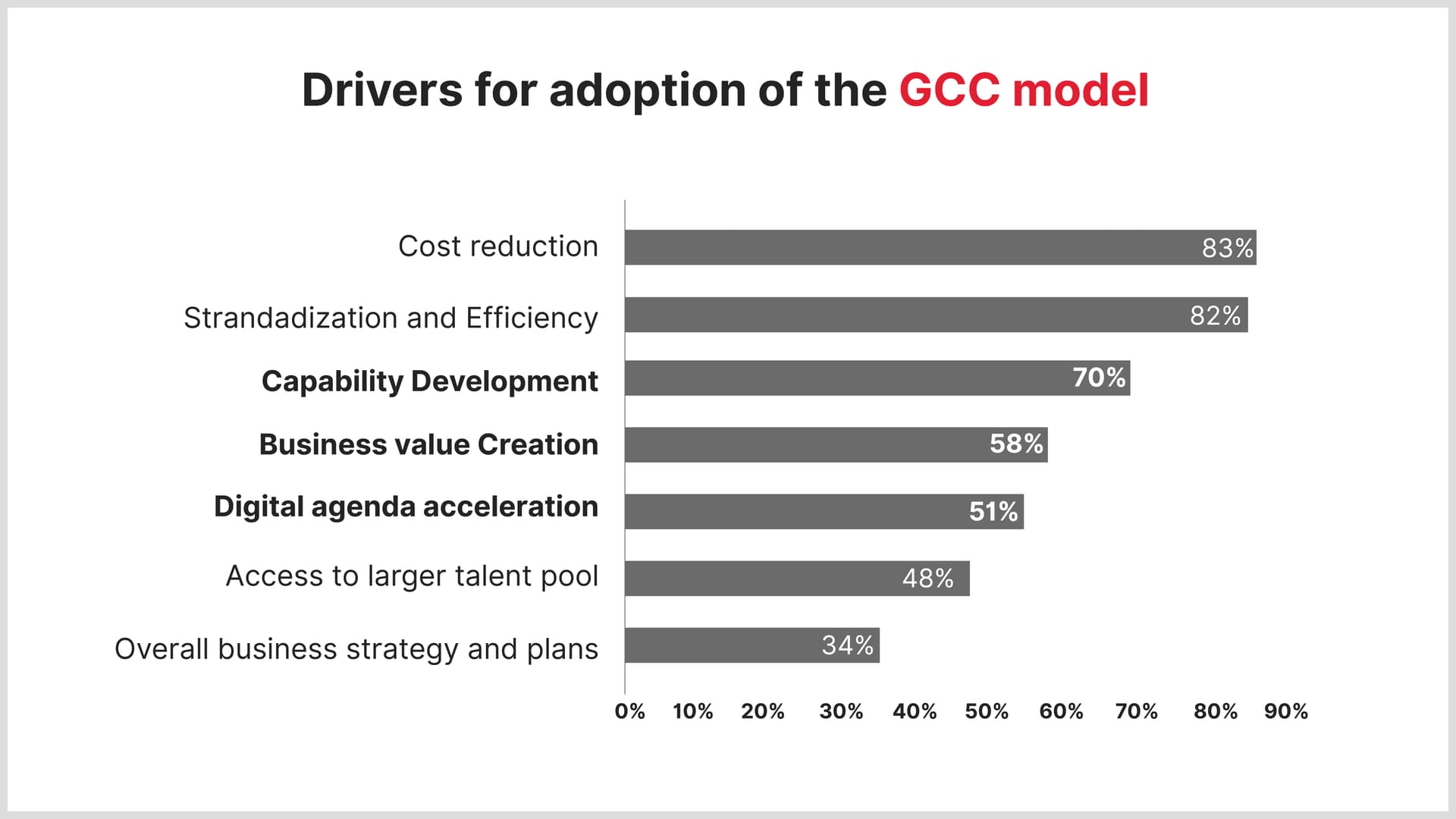Why Your Enterprise Needs a GCC to Stay Competitive in a Digital-First World
16 January, 2025
Growing Challenge of Digital Transformation
With 75% of employers worldwide struggling to find the talent they need (Forbes), the stakes for transformation have never been higher. Staying competitive in today’s dynamic market demands more than incremental improvements—it requires bold, transformative action. Enterprises grappling with outdated systems and limited agility face not only operational inefficiencies but also the eminent risk of losing their foothold in a digital-first economy.
Global Capability Centers (GCCs) have evolved from cost-focused hubs into engines of strategic transformation, re imagining traditional service models into value-generating hubs that offer a game-changing solution. By providing access to global talent, fostering innovation, and driving operational efficiency, GCCs enable organizations to overcome stagnation and thrive in a fast-paced business environment.
In 2023 alone, over 300 GCCs were established globally (Everest Group), reaffirming their role in scaling capabilities, fostering agility, and driving digital transformation.
The GCC Advantage: A Strategic Lever for Digital Competitiveness
Global Capability Centers (GCCs) are strategic hubs—offshore or nearshore centers—that empower businesses to access skilled, cost-effective talent pools while driving digital transformation. Unlike traditional service centers, GCCs are designed to foster innovation, efficiency, and agility, enabling enterprises to adapt quickly to market dynamics.

Over the years, GCCs have evolved from transaction-focused operations to become strategic drivers of innovation, market expansion, and global competitiveness.
By leveraging GCCs, enterprises get access to diverse expertise, harness advanced technologies, and achieve operational flexibility that in-house teams often struggle to provide. This competitive edge positions GCCs as indispensable assets for businesses seeking scalability, speed, and sustained growth in today’s digitally driven global economy.
The Cost of Stagnation: Risks for Enterprises Without a GCC
Without a GCC, businesses face escalating operational costs, limited access to skilled talent, and an inability to respond swiftly to market changes. The innovation gap further widens as enterprises struggle to adopt critical technologies like AI, ML, and automation, which are already propelling industry leaders forward.
The GCC model addresses critical business needs like cost reduction, talent access, and digital acceleration—essential for staying competitive in a digital-first world.

With 52% of CHROs identifying talent shortages as their organizations' primary challenge and 83% of CIOs in tech highlighting access to skilled workers as their biggest hurdle (Deloitte), the stakes for transformation have never been higher. Establishing a GCC provides a strategic solution to address these critical gaps, enabling businesses to thrive.
GCCs as Drivers of Enterprise Agility and Scaling Innovation
GCCs have entered a transformative phase, evolving into what is now termed GCC 8.0; next-generation hubs that redefine how enterprises innovate, operate, and compete. No longer mere support functions, GCCs have become strategic pillars, aligning global strategies with localized agility to drive innovation pipelines and operational excellence.
By leveraging advanced technologies like generative AI, automation, and data analytics, GCCs act as catalysts for enterprise-wide transformation. They bridge talent shortages with access to global expertise in AI, cloud integration, and engineering, enabling businesses to scale efficiently and adapt to dynamic markets.
These modern GCCs attract top-tier talent, foster visionary leadership, and cultivate cultures of continuous innovation. As enablers of agility and sustained growth, they empower enterprises to remain competitive and resilient.
How GCCs Facilitate Speed and Agility?
Without a GCC, businesses often struggle with slow responses to market changes, inefficient processes, and difficulty scaling operations. This can lead to missed opportunities and increased costs.
By balancing in-house capabilities with outsourced expertise, businesses can optimize efficiency and innovation. Models like Shared Services centralize back-office functions, reducing overhead while standardizing processes for cost savings.
Collaboration with Managed Service Providers (MSPs) further accelerates transformation by integrating specialized expertise. Center of Excellence (CoE) models drive domain-specific innovation, while Virtual Captive Centers (VCCs) and Build-Operate-Transfer (BOT) approaches allow businesses to scale rapidly with controlled investment risks.
This synergy empowers organizations to deploy resources flexibly, adapt to market changes quickly, and achieve operational excellence—all while driving continuous innovation in a competitive global landscape.
GCCs as Multidisciplinary Innovation Hubs
Once primarily focused on technology, GCCs have transformed into multidisciplinary centers, integrating expertise across healthcare, engineering, sustainability, and compliance. This shift reflects the rising demand for specialized, industry-specific innovation.
Healthcare-focused GCCs drive advancements in telemedicine and drug research, while energy and manufacturing GCCs innovate in renewable energy and advanced materials. Additionally, financial analysts, supply chain experts, and legal professionals play pivotal roles in addressing global compliance and streamlining operations.
By diversifying talent and capabilities, GCCs tackle complex global challenges, positioning themselves as indispensable hubs of innovation and strategic leadership across industries.
Cultivating Inclusive Ecosystems for Global Innovation
Diversity, Equity, and Inclusion (DE&I) are now core to GCC operations, focusing on multigenerational and intersectional diversity to foster inclusive environments. This approach enhances collaboration, drives innovation, and strengthens organizational resilience, enabling GCCs to unlock creative solutions and build high-performing, future-ready teams that excel in dynamic global markets.
To wrap up, GCCs are redefining enterprise operations, transforming these centers into strategic engines of innovation, agility, and global competitiveness. By leveraging advanced technologies and diverse expertise, GCCs empower businesses to scale talent, drive innovation, and navigate the complexities of a digital-first world.
CodeNinja’s Global Capability Center as a Service (GCCaaS) offers a turnkey solution to build scalable, high-performing teams tailored to your needs. By seamlessly integrating with your operations, GCCaaS supports your business in adapting to the demands of a rapidly evolving global market, ensuring you stay competitive and innovative without the complexities of managing multiple teams.
For more detail, visit our website
.jpg&w=256&q=75)
Zobaria Asma
Asst. Manager Brand & Communications
Zobaria serves as the Asst. Manager Brand & Communications at CodeNinja, driving brand strategy and communication efforts across diverse global markets, including APAC, LATAM, and MENA. With over 5 years of experience in scaling businesses, she brings expertise in SaaS branding and positioning. Her expertise spans a range of sectors, ensuring that CodeNinja's messaging resonates with diverse audiences while reinforcing its leadership in hybrid intelligence, AI-driven innovation, and digital transformation.
